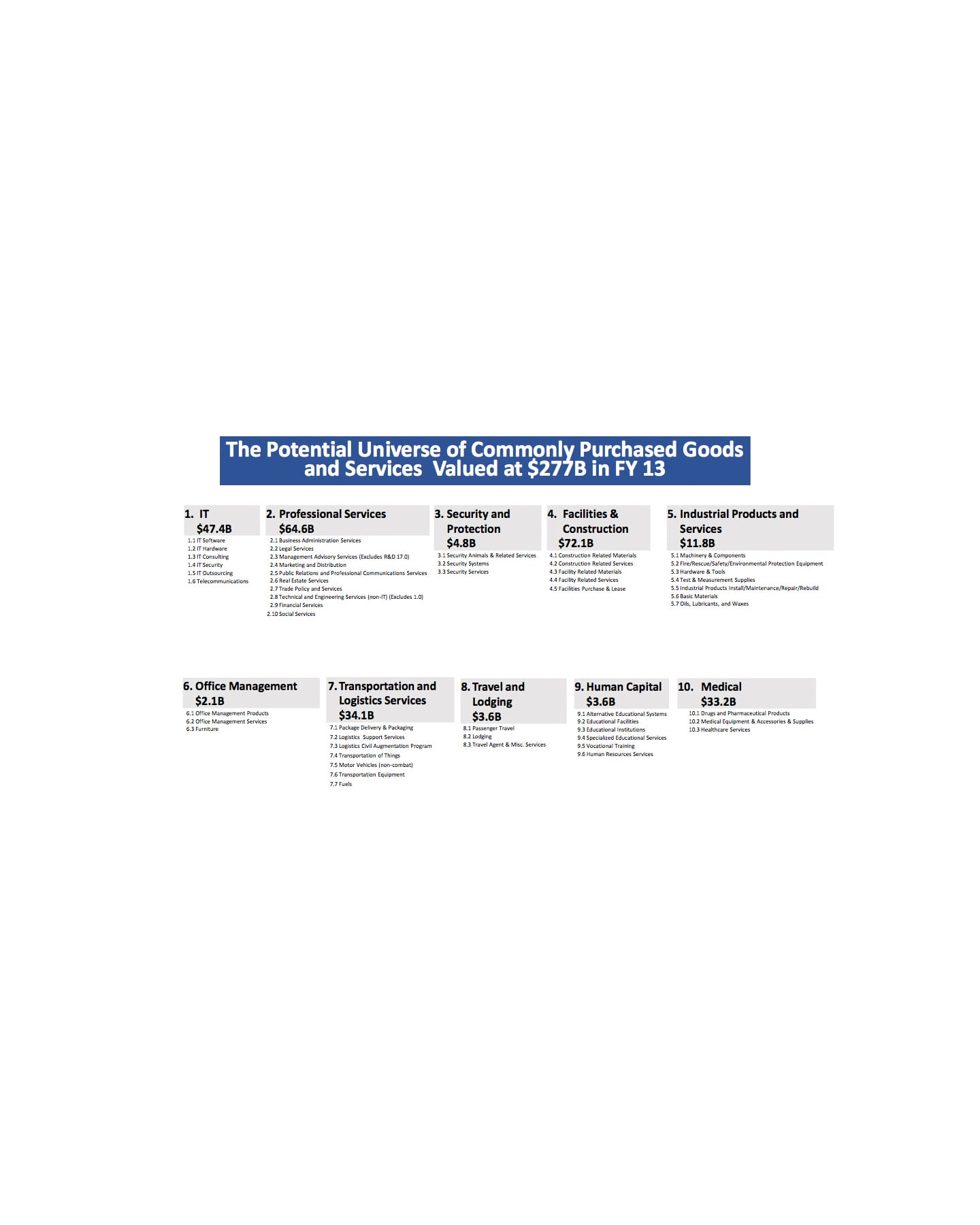![GSA Top 250 list MWM 20130718 [ID=21510961]](http://www.gannett-cdn.com/-mm-/4e2389e07916482fe12919f7086022491e9eb211/r=500x356/local/-/media/2015/01/09/FederalTimes/FederalTimes/635564118730394461-FED-GSA-Top-250-list08.jpg)
Editor's Note: This post was originally published at whitehouse.gov.
Anne Rung is the Administrator of the Office of Federal Procurement Policy.
Tom Sharpe is the Commissioner of the Federal Acquisition Service.
In December, the Strategic Sourcing Leadership Council (SSLC), comprised of the seven largest and highest-spending agencies, took a major step forward in transforming the federal acquisition landscape. The SSLC approved dividing the federal marketplace into ten super categories of commonly purchased items as part of a larger move towards "category management," an approach used extensively in the United Kingdom's government and private industry for years.
Category management is a new, more strategic approach that will enable the federal government to buy smarter and more like a single enterprise. It involves identifying core categories of spend, and developing heightened levels of expertise, sharing best practices, providing streamlined solutions, and managing supply and demand, for each of the categories. The objective is to increase efficiency and effectiveness while reducing costs and redundancies.
The ten super categories include important spending areas like IT, Transportation, Travel, and Professional Services, which make up $270B, or two-thirds, of the total spend on goods and services. Each category will be led by a team of experts who will develop a common, government-wide strategy for smarter buying. An online portal called the Common Acquisition Platform (CAP), currently in development by GSA, is the starting point that puts all acquisition categories in one place for easier navigation of purchasing options.
The categories of common spend are:
Let's take a look at why category management is so important. Today, the federal acquisition system is fragmented, with thousands of buying offices in hundreds of departments and agencies acquiring more than $400 billion in goods and services each year. Far too often, our acquisition professionals are making these purchases with very little insight into what their counterparts across the government are buying, who they are buying it from, what they are paying, and how they are buying it. In general, there is very little coordination and sharing of information and best practices across government. In fact, there is no single place a government contracting officer can go to find out important details regarding existing contract vehicles for any particular commodity area.
Recently, the Office of Federal Procurement Policy (OFPP) released an important policy memo -- Transforming the Marketplace: Simplifying Federal Procurement to Improve Performance, Drive Innovation, and Increase Savings – that makes category management an Administration priority for improving how we buy common goods and services.
This memo builds on the good work already underway within GSA's Federal Acquisition Service (FAS). Working with OFPP and the SSLC, FAS has been playing a critical role in implementing category management, both within FAS as well as government-wide. The online portal or Common Acquisition Platform (CAP) is an online tool that provides a new and transparent view of the fragmented federal acquisition landscape that will help drive the government to buy and act as one. Specifically, CAP provides government buyers with comprehensive information about existing contract vehicles from multiple agencies, current market trends and expertise, transactional data, and good practices that will help them navigate the cluttered acquisition marketplace. Within CAP, GSA has already launched "Category Hallways" or online sites– for several categories and sub-categories, like Administrative Support, Education and Training, IT Hardware, IT Software, Professional Services, and Small Package Delivery categories – see below for information about joining the CAP community.
With OFFP's direction and collaboration, GSA is taking an even larger role in implementing category management throughout the federal government. In the coming months, GSA will coordinate with the SSLC and other key players in the federal acquisition community to create guidelines for executing category management. These future guidelines will address how to independently validate cost savings, create the right performance metrics, and benchmark contract solutions to pick the right one.
Together, through this new approach to government buying, OFPP, GSA, and the SSLC agencies will play a vital role in making the federal procurement process more streamlined and transparent. Category management will empower agencies with spending data and contract intelligence so they can make more informed purchases that better respond to an agency's needs, leverage budget resources, and benefit taxpayers.
Are you ready to give it a go? Take a "walk" down one of the hallways at: https://hallways.cap.gsa.gov and let us know what you think!
Anne Rung is the Administrator of the Office of Federal Procurement Policy.
Tom Sharpe is the Commissioner of the Federal Acquisition Service.





